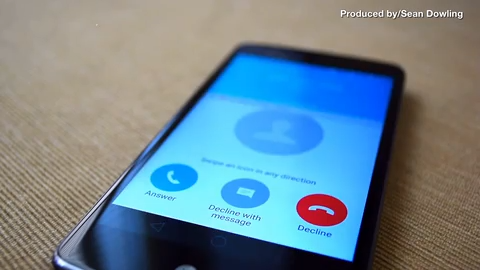
Madeline Purdue
USA TODAY
Published 2:51 PM EDT Jul 8, 2019
LOS ANGELES — Answering the phone nowadays can be like playing Russian roulette — eventually, youre going to answer a robocall, and that's a game nobody wants to play.
Robocalls are the No. 1 complaint from consumers to the Federal Communications Commission, and along with cellphone providers, they are fighting robocalls with a number of tools to make answering the phone less of a hassle.
In June, the FCC mandated service providers use caller verification at the network level to verify the legitimacy of a call — known as the SHAKEN/STIR, or Signature-based Handling of Asserted Information Using toKENs and the Secure Telephone Identity Revisited standard. This would give providers the option to stop a call before it reaches a customer, or label the call either as a verified, good caller, or warn the customer the call might be spam.
SHAKEN/STIR aims to put an end to “spoofing”, or using phone numbers similar to the persons theyre calling to trick them into picking up thinking its someone they know. It must be implemented by the end of the year by all providers.
Some providers offer spam call protection to customers already, and have other tools they use to fight robocalls. These are the tools the four major cell service providers — T-Mobile, Verizon, AT&T and Sprint — offer to their customers.
It's 'Scam Likely' calling: Don't answer: If someone named 'Scam Likely' is calling you, don't pick up
Robocall 'crackdown': FTC blocks more than a billion illegal calls, but problem festers
T-Mobile
T-Mobile is taking the same approach to spam calls as many platforms do to spam emails — by sorting and labeling them as spam before they get to customers, says vice president of engineering Grant Castle.
The network realized spam calls were a pain for their customers about two years ago and started labeling spam calls at the network level. It uses technology from First Orion to inspect calls as they come in, and label them as “scam likely”. This service is automatically offered to T-Mobile customers.
T-Mobile also offers free Scam Block service which blocks likely spam calls from reaching customers. Customers must opt into the service either by logging into their account or dialing #662# on their phones.
For even more control over what calls come through, customers can download the Name ID app for $3.99 a month after a 10-day trial period. Customers can block calls by type — political, survey, telemarketing, etc. — and can use reverse phone number lookup to see who has called them if the number is not in their contacts.
Right now, T-Mobile uses the SHAKEN/STIR verified calling for calls made on their network — meaning when a T-Mobile customer calls another T-Mobile customer. It also works with Comcast Xfinity Voice Home numbers as well, and they are working to expand the technology to calls from every network.
Castle calls on the other networks to provide verified calling at the network level and other scam protections on “not just an app” to fight spam and robocalls.
“This is an industry problem. We need to make it go away as an industry because if scammers have success with this, theyll just do it more,” Castle said.
How do they have my number?: 5 ways to avoid being put on robocall lists
Verizon
Right now, Verizon blocks a small percentage of calls that are “absolutely spam” from reaching customers, but are working “aggressively” to protect customers from robocalls, especially since SHAKEN/STIR was mandated, says Aparna Khurjekar, head of customer experience.
Verizon customers can opt into the networks Call Filter app for free, which labels spam calls and filters them from reaching a phone. It works on Android & iOS smartphones, and customers may choose to block all spam calls or just those that Verizon deems “high risk”.
The Call Filter app can also be upgraded for $2.99 a month per line and adds a custom block list and reverse number lookup. It also has caller ID for numbers not in the customers contacts.
Khurjekar urges customers to use the free app for spam protection while Verizon works on SHAKEN/STIR.
“This is a work in progress,” she said. “This is not a perfect solution, and until we get STIR/SHAKEN, theres going to be a continuous evolution of the solution, and we are only going to get better and better.”







